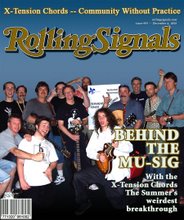
This is a story about Ab. In musical lingo, Ab is "A flat," not an abbreviation for Abraham, Abner, Absalom, or Abigail. Ab is where Owen Roberts's musical education began, and that probably explains a lot.
At age 13, Owen found it was not an option or a desire -- rather, it was a requirement -- that all cool guys be in a band. One of his best friends was Lonnie Aarssen, "an amazing keyboard player already at 13," and together they decided that if they were to be at the sharp edge of cool they needed a band. This despite the fact that Owen couldn’t play anything other than the Satisfaction riff on his acoustic guitar (a riff you can still hear any time the X-Tension Chords play) and The Wabash Cannonball.
What instrument, Lonnie wondered, could his sincere but talent-challenged pal play well enough to be part of the band (eventually called The Store, since most of the members worked at a -- you guessed it -- store)? Lonnie settled on the bass for Owen. Four strings shouldn’t be too hard, right? The only problem was, no one in the band knew much of anything about the bass: how to play it, for instance, or even how to tune it. But Lonnie was a teenager! A rebel! And in the spirit and wisdom of youth, he just made it up. (Please note: This guy is now a long-tenured, highly published biology professor at Queen’s University in Canada, one of the country’s most prestigious institutions. He also has his own blues band, and sings uptempo blues like he was born in Chicago).
To tune that bass, Lonnie focused on fundamentals, the ABCs. Or at least the A. Make that Ab. Who really knows what he was thinking? Under his expert guidance, our hero's first bass guitar (an ugly but affordable Kay) went from bottom to top, A flat, D flat, F sharp, "and I forget after that," recalls Owen, foggily. It didn’t really matter, because who played the top bass string, anyway? In fact, who played the top two strings? Show-offs, that’s who.
The best thing about this tuning was that no musicians watching him could figure out what the heck he was playing. He wasn't all that good, but he sure was different.
That merriment ended a few years and basses later, when Owen joined an established country band, The Alley Cats, to get himself through school. The band leader, Jim Stirling, was about 20 years Owen's senior and did amazing Elvis impersonations. He played a Fender Broadcaster, which is worth a mint now. He knew every country song imaginable. Owen hardly knew any, but Stirling's patience with the newcomer was legendary.
Onstage, Stirling wouldn’t even bother shouting out the name of the next song, he’d just shout out the key it started in. Owen would dutifully go to it, finger in place on the fretboard of his Hofner copy (totally out of place in a country bar, but no moreso than Owen, with his hair halfway down to his butt), waiting for the leader to kick it off. Stirling would stare over at Owen and emphatically repeat “C!,” expecting him to find the note where every other bassist would. But it was not to be. This drove Stirling nuts. "He’d see me poised," says Owen, "and keep shouting across the stage, looking at my finger position, 'C!' And I’d keep yelling back 'Got it right here!'” Stirling's wife, Gloria, was the drummer. Eventually, they divorced. Ab tuning probably had nothing to do with that, but it certainly didn’t promote harmony on stage.
In subsequent bands (The Reflections, Speed O’ Light, Canadian Grande, Spice, Hat Trick, The Mudcats, The Roberts, and most recently, the GMOs [www.gmomusic.com]), he continued to play bass for awhile, but finally switched to guitar, mainly because he was usually the lead singer/hot dog, and how many bassists (Sting and Sir Paul aside) double as leaders? "Ironically," Owen reflects, "it was then I came to appreciate the musical magic that takes place when a superb bassist and drummer hook up, like Ron and Robert in the X-Tension Chords. As the band’s quasi-front man, I can’t say enough about the rhythm foundation they give us, which is really the secret to how we can bring 12 people onstage, several of whom are shaking hands for the first time, and have it sound like we’ve been together for more than 30 seconds."


No comments:
Post a Comment